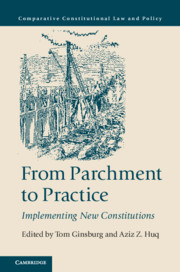Book contents
- From Parchment to Practice
- Comparative Constitutional Law and Policy
- From Parchment to Practice
- Copyright page
- Contents
- Figures
- Tables
- Contributors
- 1 Introduction
- Part I The Problem of Transformation in Constitutional Design
- Part II The Issue of Gender
- Part III Institutional Development and the Role of Courts
- Part IV Authoritarian Transitions
- 10 Transformational Authoritarian Constitutions
- 11 Authoritarian Straitjacket or Vehicle for Democratic Transition?
- 12 The Ethiopian Constitution and Ethnic Federalism
- Index
10 - Transformational Authoritarian Constitutions
The Case of Chile
from Part IV - Authoritarian Transitions
Published online by Cambridge University Press: 28 February 2020
- From Parchment to Practice
- Comparative Constitutional Law and Policy
- From Parchment to Practice
- Copyright page
- Contents
- Figures
- Tables
- Contributors
- 1 Introduction
- Part I The Problem of Transformation in Constitutional Design
- Part II The Issue of Gender
- Part III Institutional Development and the Role of Courts
- Part IV Authoritarian Transitions
- 10 Transformational Authoritarian Constitutions
- 11 Authoritarian Straitjacket or Vehicle for Democratic Transition?
- 12 The Ethiopian Constitution and Ethnic Federalism
- Index
Summary
Can a constitution born in dictatorship serve democracy, or is it inevitably tainted by the circumstances of its birth? This question is central in Chilean politics today, but Chile is not alone. Roughly 20 percent of constitutions in force today were drafted during undemocratic periods. Chile’s constitution, however, is part of a smaller set which we call transformational authoritarian constitutions. These constitutions (1) are explicitly framed as helping to structure a return to electoral democracy after a period of time; (2) reflect certain policy goals designed to be permanent; and (3) contain an enforcement mechanism to ensure that both these goals are met. The chapter then goes on to consider how constitutional reform should be achieved, drawing on comparative evidence.
Keywords
Information
- Type
- Chapter
- Information
- From Parchment to PracticeImplementing New Constitutions, pp. 239 - 262Publisher: Cambridge University PressPrint publication year: 2020
Accessibility standard: Unknown
Why this information is here
This section outlines the accessibility features of this content - including support for screen readers, full keyboard navigation and high-contrast display options. This may not be relevant for you.Accessibility Information
- 1
- Cited by
